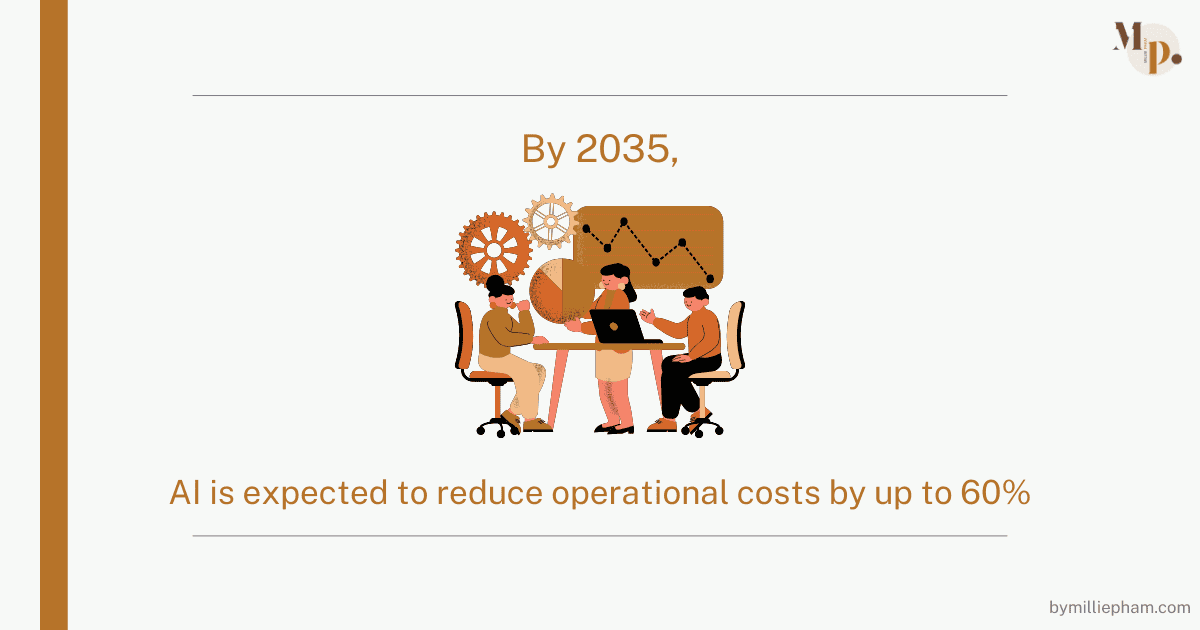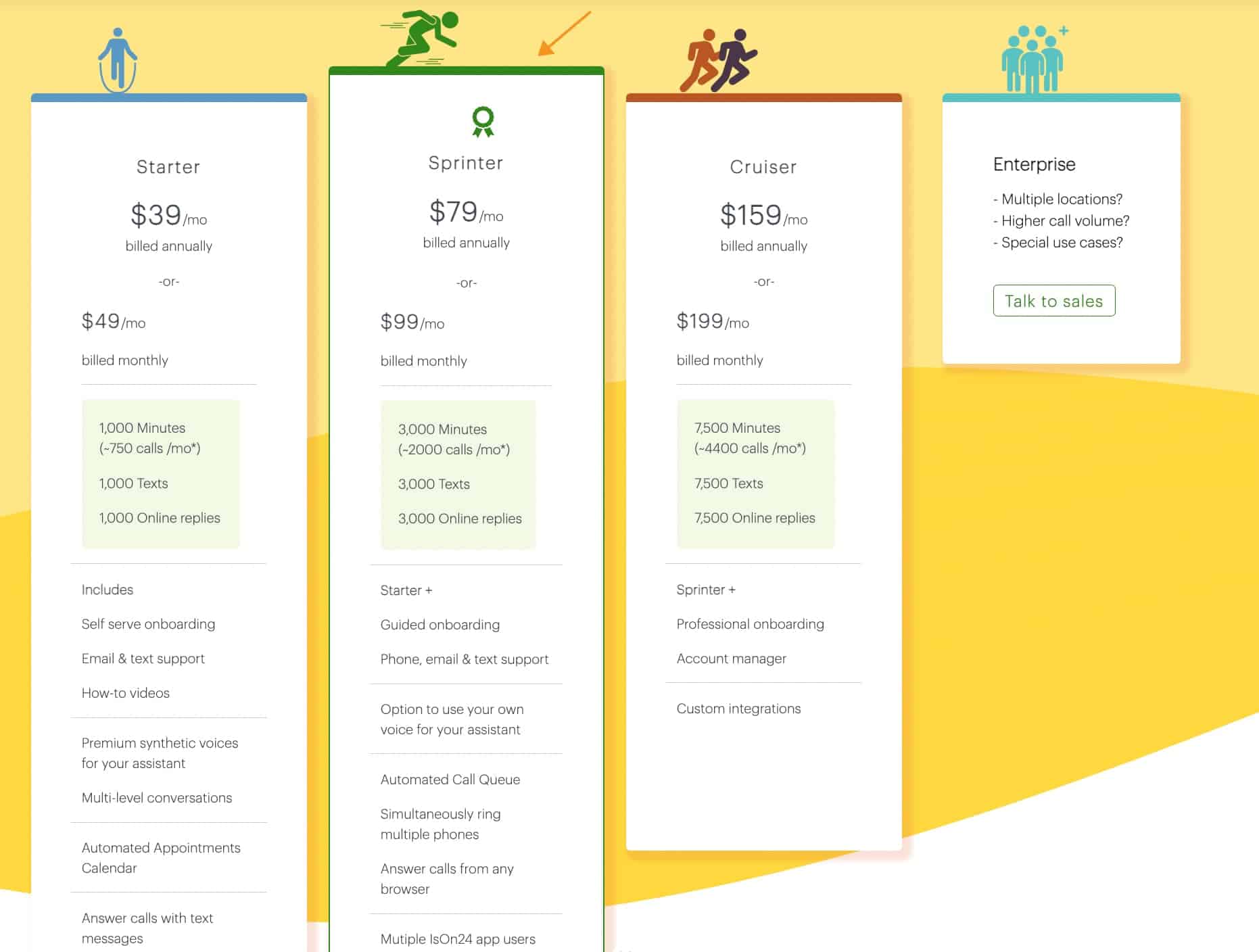Running a small business comes with constant cost concerns, especially when hiring staff like receptionists.
Paying for a full-time receptionist can quickly add up, but you still need someone to manage calls and appointments.
Here’s the good news: AI-powered receptionists offer a more affordable solution. In fact, by 2035, AI is expected to reduce operational costs by up to 60%. [1]
In this article, we’ll dive into how AI vs. human receptionists, helping you find the best fit for your business without breaking the bank.

AI vs. Human Receptionists Overview
Features | AI Receptionists | Human Receptionists |
|---|---|---|
Cost | Lower, with subscription fees ($29–$99/month) | Higher, with salary ($33,000/year) + benefits |
Availability | 24/7, no breaks or downtime | Limited to working hours, requires breaks |
Efficiency | Handles multiple tasks and calls at once | Limited by capacity, may slow during busy times |
Scalability | Easily scalable, adjusts with business growth | Needs additional hires as business grows |
Personal Touch | Lacks emotional connection and empathy | Provides a personal touch and empathy |
Flexibility | Customizable features (scheduling, FAQs, etc.) | Adaptable to complex and emotional situations |
Long-term Savings | Higher savings over time, no recurring training | Higher ongoing costs (salaries, training, etc.) |
The Role of Receptionists in Small Businesses
Receptionists play a big part in how customers see your business. They’re often the first person a customer talks to, which means they set the tone for your brand.
A friendly and helpful receptionist can make a great first impression, and 93% of customers are more likely to return to a business that provides good customer service [2].
Receptionists handle a lot of tasks, from answering calls and scheduling appointments to managing emails and greeting visitors.
They keep things running smoothly, acting as a bridge between your business and customers.
However, for small businesses, hiring full-time staff can be tough.
It’s not just about the salary—you have to consider benefits, training, and finding the right person who fits the role.
Balancing these costs can be challenging, especially for businesses working with a tight budget.
Cost Comparison: AI vs. Human Receptionists
When comparing costs, human receptionists come with a lot of expenses. The average salary for a full-time receptionist in the U.S. is about $33,000 per year [3]
On top of that, businesses also have to cover benefits like health insurance, vacation time, and sometimes even bonuses. These costs add up quickly for small businesses.
On the other hand, AI receptionists have upfront setup fees and subscription costs. These can range from $29 to $99 per month for the basic plan, depending on the service you choose.

Pricing of Ison24 - an AI answering assistant
Once the AI is in place, there’s no need to worry about benefits or overtime pay.
While there might be some costs for software updates or maintenance, they are generally lower than keeping a full-time employee.
In the long run, AI can offer significant savings. You avoid recurring expenses like salaries, training new hires, or dealing with turnover when employees leave.
Over time, the savings with AI can really add up, making it a cost-effective option for many small businesses looking to cut costs.
Efficiency and Availability
Human receptionists are great at providing a personal touch.
They can adapt to different situations, show empathy when needed, and build real customer connections. This can make customers feel valued, which is important for any business.
AI receptionists, however, are available 24/7.
They respond quickly, don’t need breaks, and can handle tasks any time of day or night. This makes them perfect for businesses that want to make sure no calls are missed, even after hours.
When it comes to multitasking or handling a lot of calls at once, AI can often manage better.
It can juggle multiple calls or requests without slowing down, while human receptionists might struggle to keep up during busy times.
Both have their strengths, but AI wins for businesses that need constant, round-the-clock support in terms of efficiency and availability.
Here’s an example of how AI handles a restaurant reservation.
The AI instantly answers, asks for the preferred date, time, and party size, and then checks the restaurant's booking system.
Within seconds, it confirms the reservation all without missing a beat.
4. Scalability and Flexibility
One of the best things about AI reception services is how easily they can grow with your business.
As your business gets bigger and you get more calls, AI can adjust without a problem.
You don’t need to hire extra staff or worry about training new people. All you need is to maybe upgrade to a higher plan when needed.
On the other hand, with human receptionists, scaling can be hard.
When your business grows, you may need to hire more staff, which takes time and adds costs. It can be tough to keep up with the demand, especially during busy periods.
AI also offers flexibility in how you use it. To better fit your business needs, you can add new features, like scheduling, answering FAQs, or even language options.
This kind of flexibility helps your business stay efficient and prepared for growth.
5. AI Technology and Features for Reception Services
AI receptionists come with useful features like voice recognition, which helps them understand and respond to spoken requests.
This makes it easy to route calls quickly without needing a person to answer. For example, AI can figure out whether the caller needs sales or support and send them to the right place.
They also excel in call routing and can automatically connect callers to the right person based on availability.
Scheduling is another feature, allowing AI to book appointments or reservations on the spot.
AI can integrate with CRM systems to store important customer data, making follow-ups easier.
Plus, it gets smarter over time—learning from each interaction to improve its accuracy and performance.
6. Human Receptionists: Advantages of a Personal Touch
Human receptionists offer something AI can’t always provide—a personal connection.
They can build real relationships with clients, remembering names, preferences, and even details about past interactions.
This personal touch can make customers feel valued and heard, which is essential in industries like healthcare, law, and hospitality.
In fact, 86% of consumers prefer speaking to a human for complex customer service issues. [3]
In certain situations, human receptionists shine.
For example, their empathy and ability to handle sensitive conversations make a big difference when emotions run high, like in healthcare or legal matters.
They can adapt to unique situations, provide reassurance, and offer customized responses that AI might miss.
This flexibility and emotional understanding are where human receptionists truly stand out
7. Making the Right Choice: Which is Best for Your Business?
Consider a few key factors when deciding between an AI receptionist and a human one.
First, look at your budget. AI receptionists are usually more affordable in the long run, but if you prioritize personal interactions, you might need to invest in human staff.
Business size also matters. Larger businesses with high call volumes may benefit from AI’s ability to handle multiple calls at once, while smaller businesses might prefer a personal touch.
Lastly, think about your customer needs—some industries, like healthcare or law, often need empathy and flexibility that only humans can provide.
A hybrid solution works best for some businesses, where AI handles routine tasks (like scheduling) while human receptionists manage more complex or emotional conversations.
This can offer a good balance between cost-efficiency and quality service.
An AI receptionist could be ideal for small businesses if you have a limited budget and need 24/7 availability.
But if your business relies heavily on building personal relationships with clients, a human receptionist, or a combination of both, might be the better fit.
AI vs. Human Receptionists: Conclusion
In the battle between AI and human receptionists, there’s no one-size-fits-all answer.
Small businesses need to consider their specific needs, budget, and customer preferences when choosing the right solution.
AI offers cost savings and 24/7 availability, while human receptionists provide a personal touch that many customers value.
Ultimately, the right balance may lie in combining both approaches to get the best of both worlds.
Ready to explore AI receptionist solutions? Contact us today to see how AI can transform your business!
